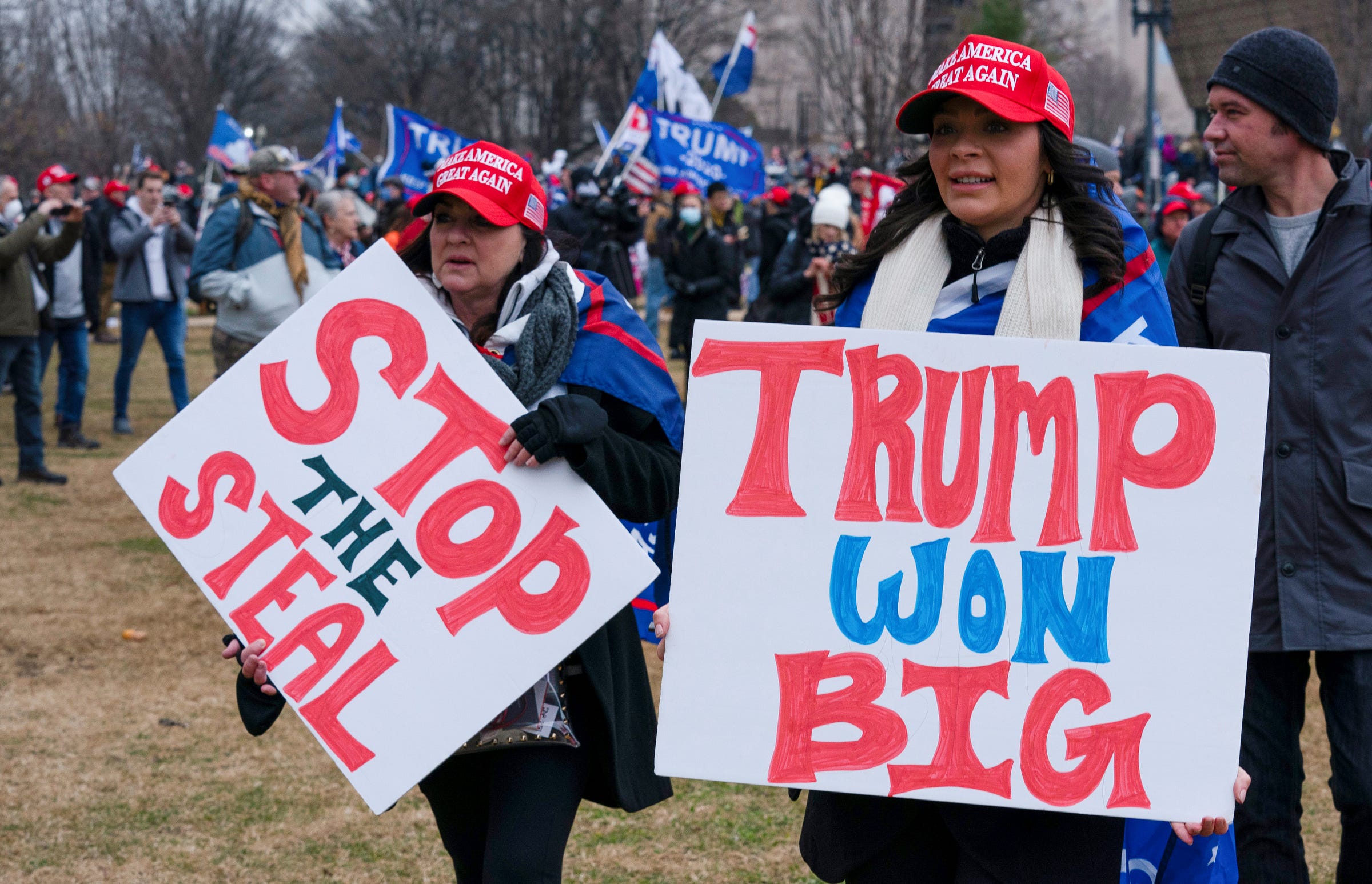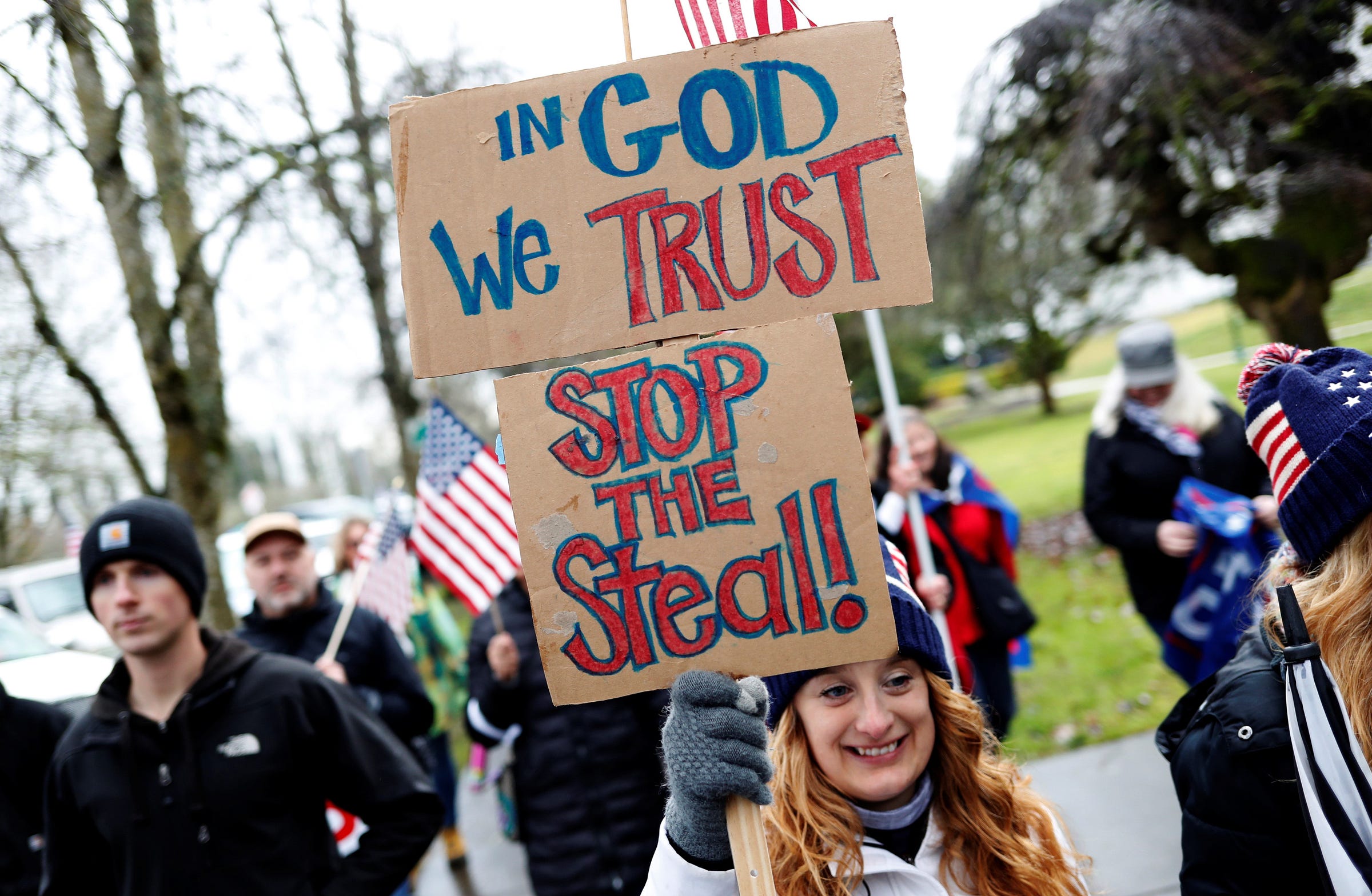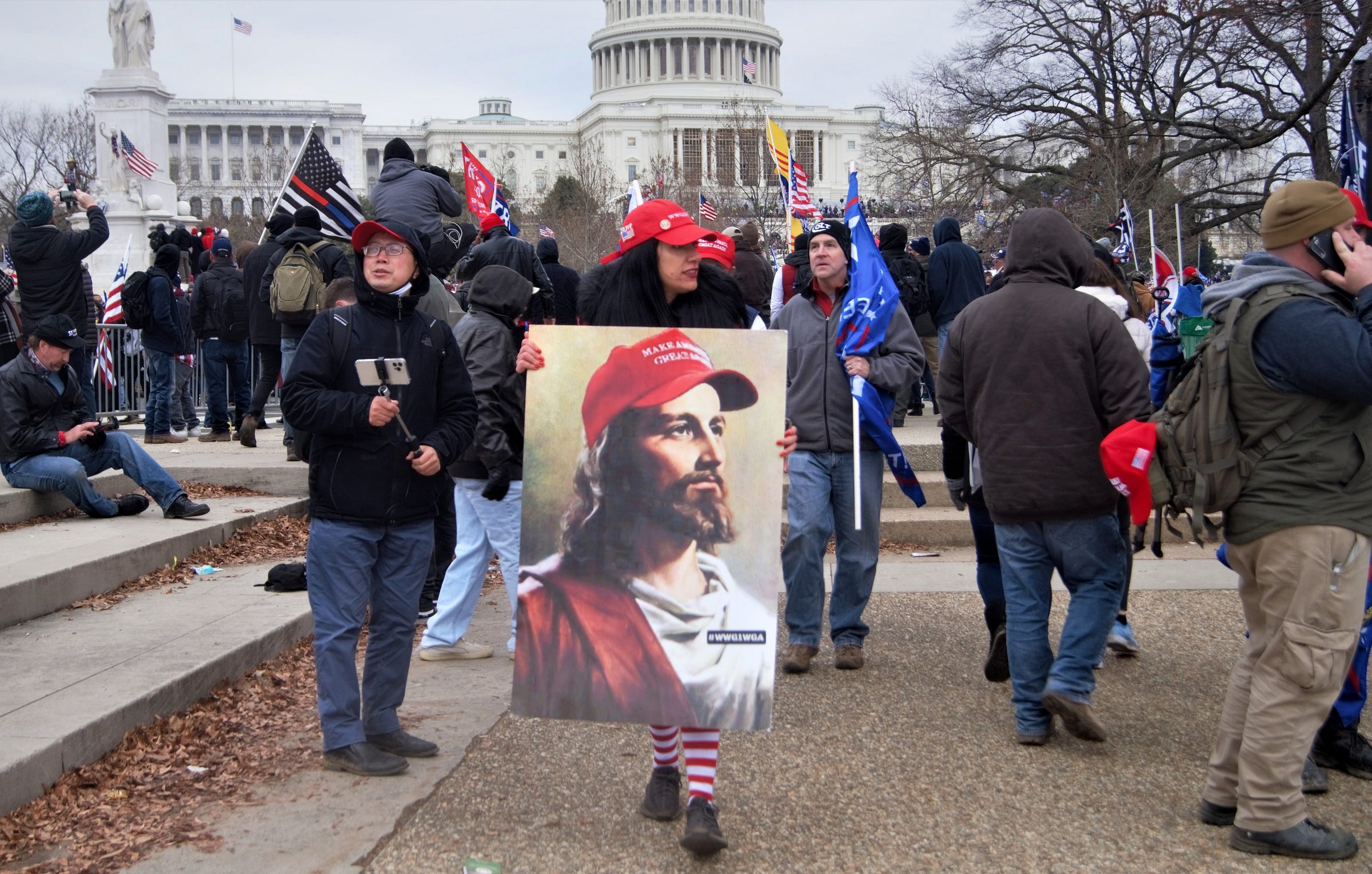Claiming the Capitol in God’s Name
Ahead of the insurrection at the U.S. Capitol nearly two years ago, a key organizer of the effort to overturn the 2020 presidential election filed a permit application to reserve part of the green space on the Capitol grounds for that fateful day. But Ali Alexander, the leader of the “Stop the Steal” organization, didn’t want his group’s name on the permit application for the day then-President Donald Trump promised would be “wild.”
So Alexander, who was promoting the Jan. 6 protest on his new website WildProtest.com, sent a text related to the permit application: “I will have the team make separate One Nation Under God graphics in case the cops ask you for a copy of promos so you can deny WildProtest being totally affiliated or whatever.”
His event, which tens of thousands of people signed up for, advertised speeches from several members of Congress (like Reps. Lauren Boebert, Ted Budd, Paul Gosar, and Marjorie Taylor Greene) and activists like Roger Stone, Doug Mastriano, and Lance Wallnau. But on his permit application for space on the Capitol grounds, Alexander’s name doesn’t appear. Nor do “Stop the Steal” or “WildProtest.” Instead, the box for the host organization reads, “One Nation Under God.”
There was no such organization. Alexander admitted as much when he was deposed by the House Select Committee that investigated the insurrection. The transcript of his testimony, released by the committee on Dec. 27, includes investigators pressing him about his text that suggests he deliberately intended to mislead Capitol police. As an investigator put it during Alexander’s deposition: “It is a fake entity called ‘One Nation Under God’ instead of ‘Stop the Steal’” listed on the application.
Investigators went in circles with Alexander about his text regarding the graphics. Even as they pressed him in the deposition, he attempted to explain away the clear language he had written. He also insisted the “One Nation Under God” name was chosen for Jan. 6 because his Stop the Steal effort was a spiritual movement.
“It wasn’t exclusively political, and it was also religious and we were doing prayers and the blowing of the shofar and it was a very Judeo-Christian event and that was going to be the real focus,” Alexander said. “I even talked about changing hearts and minds. So we were seeking a political, legislative remedy from the outside. It was very [a] spiritual thing and so we had to call it ‘One Nation Under God’ because there’s a bunch of Christian groups that didn’t fit into Stop the Steal. Some Christian groups did but not all did.”
“Stop the Steal could not just be political; it needs to be a Christian ministry as well,” he added. “Some groups didn’t consider themselves political; they just wanted to pray over Democrats and Republicans, but they wanted to participate. They thought it was historic. And so we called it ‘One Nation Under God’ because we also thought, well, we don’t want to over-advertise this.”
Alexander, whose name shows up more than 100 times in the House Select Committee’s final report, used a fake, religious name to reserve space on the Capitol grounds as he hoped to not “over-advertise” his event. Yet, he was literally advertising it on his WildProtest website to invite tens of thousands to come, even as his permit application claimed they would have fewer than 50 people at the event (a number they needed to stay beneath for approval). Apparently like with the graphics, who he didn’t want to “over-advertise” to was “the cops.”

As the second anniversary of the insurrection arrives later this week, we are still grappling with what happened that day. And the co-opting of religious symbols and rhetoric remains a key part of the story that is too often ignored. But many activists working to overturn a presidential election literally claimed the grounds of the U.S. Capitol in the name of God. So in this issue of A Public Witness, I look at the efforts of Alexander and others to baptize their political movement and what this teaches us about claiming God’s name.
Stop the Steal
The launch of a “stop the steal” website actually occurred before the election. Not merely the 2020 presidential election. Before the 2016 election.
Political trickster Roger Stone’s political action committee launched a “stop the steal” site in 2016 to fundraise off claims that Hillary Clinton and the Democrats would steal the election from Donald Trump. In addition to raising funds, Stone was laying the groundwork for making claims about the election after Trump lost. But when the electoral college went Trump’s way, the “stop the steal” slogan suddenly went away. Until Trump lost both the popular vote and the electoral college four years later.
A number of MAGA activists invoked the phrase in the days and weeks after the 2020 election. But Ali Alexander quickly rose to lead the most significant group using this name — apparently with Stone’s blessing.
“I was the guy who started Stop the Steal as a protest movement, which is separate from people chanting it, which is separate than the origin of the phrase,” Alexander told the House Select Committee. “Roger Stone is the gentleman who came up with the phrase ‘Stop the Steal.’ I have this gentleman’s agreement with him that I have a perpetual use of the license.”
The son of a Black Christian woman and a Muslim Arab father who left when Alexander was just two, Alexander grew up in Texas. He said he considered becoming a minister and so attended Criswell College (a Baptist school founded by the late fundamentalist stalwart W.A. Criswell) before transferring to the University of North Texas but dropped out. After a couple of felony convictions for credit card abuse, he found his future in Republican politics where he proved successful at raising money, utilizing social media, and building relationships with prominent politicians. Along the way, he also came to know political tricksters like Stone and James O’Keefe.
When it became clear the 2020 election wouldn’t go in Trump’s favor, Alexander quickly capitalized on his political connections and his social media savviness to launch the Stop the Steal effort. With this movement, Alexander pushed rallies at state capitols and election counting sites across the country that included appearances by figures like Charlie Kirk of Turning Point Action, Proud Boys leader Enrique Tarrio, radio commentator Alex Jones, Nick Fuentes (who recently sparked controversy by dining with Trump), and the “QAnon Shaman” who later went to prison for his actions on Jan. 6. Alexander also used violent imagery in his rhetoric in the days leading up to the insurrection.

From the beginning Alexander framed this Stop the Steal effort in spiritual terms: “I felt this rush of conviction, you know, because I’m a Christian.” He reiterated that in his deposition, insisting that “it was a religious and political thing.” As he talked about those who helped him get the permit for the alleged “One Nation Under God” event, he highlighted why he trusted them: “They are both Christian and I’m a Christian.” He also talked in his deposition about working with Kirk, religious-political activist Ed Martin, and the controversial Christian fundraising site GiveSendGo.
While Alexander might have chosen to apply as “One Nation Under God” instead of “Stop the Steal” to aid the success of his permit application, it also matched his rhetoric of frequently invoking God and professing Christianity to justify his political activism. And he’s not alone in attempting that mixture.
Surrounding the Capitol
In addition to the main rally Trump held on the Ellipse between the National Mall and the White House (where mass rallies can gain permits), several smaller events received permits from Capitol police to utilize grassy areas on the Capitol grounds. Including Alexander’s “One Nation Under God”/”Stop the Steal” event, five other groups received permits for rallies of no more than 50 people. And like Alexander’s, three other applications specifically framed the events as religious responses to the election.
Activist Jo Reitkopp applied for a permit for “Jesus Lives,” which was described on the application as “a Christian prayer event” with Christian music, the blowing of a shofar, and “praying for our country.” On Facebook, she described the effort as a “Jesus Revival,” adding, “Pray for America 2 Chronicles 7:14.” She also wrote, “We are God’s Warriors” and “I wish I could be in the Capitol on the 6th!!!” The founder and leader of Make California Great Again, Reitkopp had previously made news when authorities rescued 136 dogs living in her mansion in allegedly horrific conditions.
Rock Ministries Church International in Charlotte, North Carolina, applied for a permit for a “prayer campaign encouraging pastors, leaders, and citizens to pray for the United States.” Belton Platt, the Black Pentecostal pastor who leads the congregation, posted messages of support for Trump on social media and trekked multiple times to Washington, D.C., ahead of Jan. 6 to pray for the nation and Trump.
In fact, in a livestream for “prayer and prophesy” on Dec. 31, 2020, Platt talked about how he had been praying at the Capitol to “pull down the satanic stronghold” there. He then excitedly said the election was “not over until Mike Pence do [sic] his job there at the Capitol.” He added, “God will be glorified.” Several months later, Charlotte city officials named Platt the head of a new effort to reduce gun violence, but he was reportedly let go just a couple months later over inconsistencies in official paperwork.
Women for America received a permit to hold a “50+ Days of Blessing” vigil on the Capitol grounds on Jan 4-6. They said on their application that the event would be to “pray and worship for our nation.” The group is led by a longtime religious-political activist who invoked her faith to back Trump.
Two other permits given for small demonstrations on the Capitol grounds on Jan. 6 were for anti-vax group Virginia Freedom Keepers and a person named Bryan Lewis who wanted to “urge Congress to nullify votes from states that made illegal changes to voting rules.”
Each of these events — four of them explicitly invoking Christianity — meant most of the green space immediately surrounding the Capitol was reserved for Trump supporters. With promises of small crowds and no civil disobedience, each received a low threat assessment from Capitol police. But instead of several peaceful demonstrations, the scene that day was a large crowd overflowing from the main Trump rally and moving right toward the Capitol.
Alexander might have been the only one hiding his intentions, but the others also helped claim the land for God and prepare the way for the mob.
Taking God’s Name in Vain
During his deposition with the House Select Committee, Alexander complained that because of Jan. 6 investigations, he “went from living the American Dream to experiencing an American nightmare.” He added he felt that “my belief that Christ is king and concerns about election irregularities have been weaponized against me.” But the House Select Committee didn’t target him because of his beliefs about Christ. They subpoenaed him because of the role he played in encouraging a violent attack on our democracy.
While congressional and legal investigators aren’t targeting Alexander for his faith, Christians should speak out against the misuse of our faith for profane purposes. And we should reclaim the moral ground from those who use God as a tool in a quest to gain power (and mislead cops). After all, that is what it means to take God’s name in vain.
Taking the Lord’s name in vain doesn’t really refer to cussing. It is instead a command against claiming the name of God but then not living like it.
“The words ‘in vain’ mean ‘empty and meaningless, of no account, of no seriousness,’” theologian Clarence Jordan explained in his book The Substance of Faith. “We take it and on we go and it means nothing. We keep sailing under the same old banner, living the same old life, having the same old attitudes, walking in the same old way. The name has meant nothing to us. It doesn’t change us. You don’t take the name of the Lord in vain with your lips. You take it in vain with your life.”
“God is interested in his name. He’s interested in it because the only way he has of making himself known is through the people who bear his name. You can see him in the lightning and hear him in the thunder; you can watch the mighty waves roll. But God cannot really make himself known unless he has some flesh — human flesh — through which to make himself known,” Jordan added. “We bear his name and this is the only way he has of making himself known to the people.”
Taking the Lord’s name in vain looks something like using God on a permit application to trick the Capitol police from knowing who is asking for the space. Taking the Lord’s name in vain looks something like talking about your Christian faith while supporting proponents of antisemitism. Taking the Lord’s name in vain looks something like professing Christianity while spreading lies that led to a violent insurrection.

That’s why Christians must challenge the ungodly rhetoric and actions of individuals like Ali Alexander on Jan. 6. If we remain quiet, people will look at the Christian flags flying on that day, the Christian worship rallies that claimed the Capitol grounds, and the prayers of the insurrectionists during the violence and think all of that is what following God means. And that makes me want to cuss.
As a public witness,
Brian Kaylor



When I meditate on the name of God in the Word of God, I shudder to think how His all-powerful, righteous, magnificent, holy, splendid and incomparable name has been bantered about for cheap, shoddy, and demeaning political gains. If only these people misusing His name really knew Who they were mocking. God help us all.
Terrific writing! This is why I am a paid subscriber. The concept of taking the Lords name in vain meaning a whole lot more than swear words is an important one. I pastor a United Methodist congregation and have not found a good way to bring up white Christian nationalism. Main line denominations avoid discussing social issues because we’ve already lost so many people and don’t want to risk offense, but what could be more important than misusing the gospel message for political power, and to hurt people? Then again, that is exactly how social issues have been used for a long time. 
Great food for thought. Thanks again.